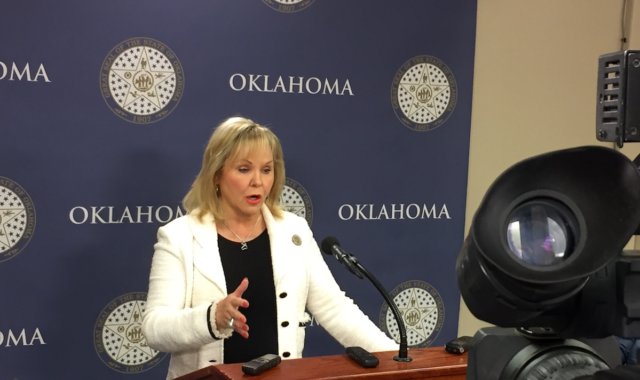
Gov. Mary Fallin has called for a second special session of the 2017 Oklahoma Legislature, announcing today that lawmakers will return Monday, Dec. 18. Her press release noted she has not yet filed an executive order for the second special session.
“Discussions are continuing with legislators and Oklahomans in all types of professions from across the state on a long-term, predictable solution to fix our budget and fund core services,” Fallin said in her release. “Budget plan estimates are being developed on various revenue proposals. Instead of waiting for final details, I wanted to give legislators enough notice as possible about when they should return to the Capitol.”
Fallin vetoed a majority of HB 1019 on Nov. 17, hours after the House and Senate had each adjourned sine die. The bill was the Legislature’s revised general appropriations bill, and the portions she left in place provided funding for the beleaguered health care agencies that had been the focus of the year’s first special session.
The year’s second special session could abut deadlines for the 2018 Oklahoma legislative session. Requests for House and Senate bills to be drafted by staff are supposed to be made by Friday, Dec. 8. Regular session is scheduled to start Monday, Feb. 5.
Between 2017’s regular session and its first special session, lawmakers have been in session for 164 days this year.
Background ahead of second special session
The Legislature’s first special session of 2017 lasted from Sept. 25 to Nov. 17. House GOP leaders originally said their goal was to pass a $1.50 cigarette tax to fill a $215 million budget hole, primarily for three health and social service agencies: the Oklahoma Health Care Authority, the Oklahoma Department of Human Services and the Oklahoma Department of Mental Health and Substance Abuse Services.
But with a stand-alone cigarette tax appearing unlikely to receive support from House Democrats, negotiations moved to a revenue bargain including multiple tax increases. The Senate pushed for such a package to include a gross production tax increase, but a House floor vote fell five members short of passing into law.
Fallin and others have said the 2018 Legislature will start with a revenue hole of more than $600 million owing to continued use of one-time funds to fill previous gaps.





















